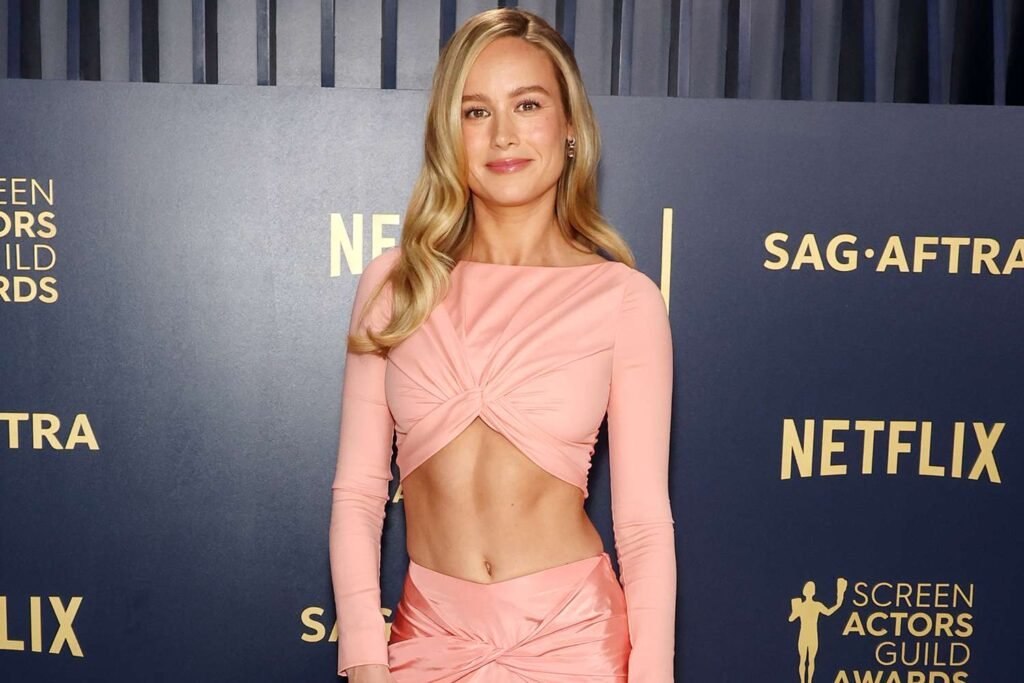
What is Brie Larson's Sexuality
Introduction to Brie Larson
Brie Larson is a renowned actress, celebrated for her versatility and commanding presence on screen. She has carved out an impressive career in Hollywood, known for her commitment to complex roles and her ability to convey deep emotionality. Larson first garnered significant critical acclaim for her role in the drama *Room* (2015), where her performance as a kidnapped woman striving for her freedom earned her an Academy Award for Best Actress. This role cemented her status as one of the most talented actresses of her generation.
In addition to her Oscar-winning performance, Brie Larson’s portrayal of Captain Marvel in the Marvel Cinematic Universe (MCU) has further elevated her profile. As the first female superhero to headline a Marvel film, Larson’s role as Carol Danvers has become iconic, inspiring countless audiences worldwide and contributing to the ongoing conversation about diversity and representation in media. Her commitment to the character and the empowerment message of Captain Marvel has resonated particularly with young women and girls, further solidifying her influence in the entertainment industry.
Beyond her blockbuster achievements, Brie Larson has also appeared in various critically acclaimed films such as *Short Term 12* (2013), *The Glass Castle* (2017), and *Just Mercy* (2019). These performances showcase her range and dedication to bringing nuanced, emotionally rich characters to life.
Brie Larson’s impact extends beyond her filmography. She is an outspoken advocate for a range of social issues, including gender equality and diversity in Hollywood. Larson has used her platform to call for greater representation and inclusivity, highlighting the importance of providing opportunities for underrepresented groups. Her activism is not limited to speeches and interviews but is also evident in her efforts to support and mentor emerging talent within the industry.
Overall, Brie Larson’s achievements as an actress, icon, and advocate position her as a formidable force within the entertainment world. Her dedication to her craft and her commitment to social issues continue to inspire and influence both her peers and audiences alike.
Public Discussions About Sexuality
Public figures, such as Brie Larson, often play a critical role in shaping societal conversations around sexuality. When celebrities openly discuss their sexual orientations, they not only contribute to a more inclusive dialogue but also set examples that normalize diverse identities. Brie Larson’s visibility and influence in Hollywood give her a unique platform to impact these discussions profoundly. By addressing her own experiences and thoughts about sexuality, she helps diminish the stigma associated with non-heteronormative identities.
Significant strides have been made in the realm of LGBTQ+ rights, yet there remains much work to be done. Celebrities who are candid about their sexuality can hasten this progress by fostering greater acceptance and understanding. Fans of Brie Larson and other celebrities often look up to them, making their advocacy and openness incredibly influential. The presence of public figures discussing their sexuality provides representation, making it easier for fans to see themselves reflected in the media they consume. This visibility can be especially powerful for young people who are grappling with their own sexual identities.
Furthermore, public discussions about sexuality by celebrities help highlight the diversity within the LGBTQ+ community. Their voices bring attention to the various nuanced experiences that exist, thus broadening societal understanding. Brie Larson’s engagement in these conversations underscores the importance of creating spaces where diverse sexual orientations are not only accepted but celebrated.
In addition to providing representation, public discourse initiated by celebrities can also drive legislative and social change. When someone with Brie Larson’s reach discusses issues related to sexuality, it can prompt more informed public debates and potentially influence policy-making. This broader acceptance and normalization have a cascading effect, reducing discrimination and paving the way for more inclusive environments.
Brie Larson’s Personal Statements
Brie Larson has been a figure of considerable public interest, not only for her acclaimed performances in film but also for her candidness regarding her personal life, including her sexuality. Over the years, Larson has utilized various platforms to share insights about her identity, emphasizing honesty and openness as cornerstones of her public persona. In several interviews and social media posts, she has directly addressed and astutely tackled queries concerning her sexual orientation.
In an interview with the Gay Times in 2019, Larson was asked about the representation of the LGBTQ+ community in her projects. She articulated, “What breaks my heart is to know that there are still people in this world who feel like they can’t express who they truly are. We all deserve to live with integrity and authenticity.” Though not an outright declaration of her sexuality, her words reflected a deep empathy and solidarity with those grappling with their identity.
On social media, particularly Instagram, Brie Larson has been more forthright. In a live stream conversation during Pride Month, she candidly mentioned, “I don’t believe that there is a single, clear path or label that can capture the complexity of human attraction and love.” This statement, alongside her support for various LGBTQ+ causes and her portrayal of LGBTQ+ characters onscreen, signifies her embrace of fluidity and the spectrum of sexual orientation.
Moreover, Larson’s participation in multiple LGBTQ+ advocacy initiatives underscores her commitment to fostering a supportive and inclusive environment. Her presence at events like the GLAAD Media Awards and her vocal endorsement of LGBTQ+ rights are seen as pivotal. By consistently aligning her public appearances and statements with her support for the community, she underpins the significance of representation and the freedom to be oneself.
Through these channels—interviews, social media posts, and public appearances—Brie Larson has conveyed a message of acceptance and fluidity. While she may not always label herself, her advocacy clearly communicates a respect for diverse expressions of love and identity.“`html
Brie Larson’s revelations about her sexuality have generated a wide array of reactions from fans and the media, illustrating the intricate and often polarizing nature of public discourse on such matters. On social media platforms, responses have ranged from enthusiastic support to critical skepticism. Twitter, in particular, witnessed an outpouring of admiration, with many users praising Larson for her bravery and openness. Numerous fans expressed solidarity, commending her as a role model for being authentic, and sharing their own experiences of coming out.
Conversely, some users reacted negatively, questioning the sincerity of her statements or accusing her of seeking attention. These criticisms largely stem from the entrenched biases and stigmas that continue to pervade discussions on sexuality. Such polarization underscores the challenges faced by public figures like Brie Larson who choose to share personal aspects of their lives.
The media’s response mirrored this dichotomy. Various news outlets, including prominent entertainment and lifestyle magazines, published articles celebrating Larson’s candor. They highlighted the potential positive impact her honesty could have on fans struggling with their own identities. For instance, publications like “The Hollywood Reporter” and “Vogue” ran features that praised Larson’s role in advancing LGBTQ+ visibility in the mainstream cinema industry.
However, the coverage was not universally positive. Some editorials criticized the timing of her disclosures or speculated on the implications for her career, suggesting that certain segments of the entertainment industry might react conservatively. This reflects a broader societal tension between progressive attitudes towards LGBTQ+ issues and traditionalist perspectives that still hold significant influence.
Fan communities further exemplified this spectrum of reactions. Online forums dedicated to Brie Larson saw earnest discussions, with some participants sharing personal anecdotes of how her statements resonated with them or inspired them. Others debated the motivations behind her revelation, highlighting the complex dynamics at play when discussing the sexuality of public figures.
Overall, the reactions to Brie Larson’s statements on her sexuality illustrate the ongoing evolution of public discourse surrounding LGBTQ+ issues. They also underscore the significant role that media representation and celebrity influence play in shaping societal attitudes. By navigating both praise and criticism, Larson continues to spark important conversations about authenticity, acceptance, and the multifaceted nature of identity.
Brie Larson as an LGBTQ+ Ally
Actress Brie Larson has earned considerable acclaim, not just for her talents on screen but also for her steadfast support of the LGBTQ+ community. Beyond speculation about her own sexuality, Larson’s advocacy efforts have positioned her as a prominent ally. Her commitment includes using her platform to amplify marginalized voices and championing equal rights for all genders and sexual orientations.
Larson has been vocal about her support for LGBTQ+ rights both in media interviews and through her social media channels. She frequently shares messages of solidarity and encouragement with her followers, emphasizing the importance of acceptance and inclusivity. Her public declarations often highlight the importance of love and respect, stating that everyone deserves to be treated equally regardless of their sexual orientation or gender identity.
Moreover, Brie Larson has participated in numerous events that support LGBTQ+ causes. For instance, she has attended Pride parades and other LGBTQ+ celebrations, showcasing her support in very visible and public ways. Her presence at these events, often seen donning the rainbow flag or other symbols of LGBTQ+ pride, sends a powerful message about her commitment to the cause.
Larson’s influence extends to her professional choices as well. She has been involved in film projects that explore LGBTQ+ themes and stories, thus contributing to broader representation in the entertainment industry. By doing so, she’s aided in bringing these narratives into mainstream consciousness, encouraging audiences to embrace diversity and inclusivity.
Overall, Brie Larson’s role as an ally to the LGBTQ+ community is marked by her active advocacy and public support. Through her continuous efforts, she promotes a more inclusive and accepting society, affirming the inherent value and dignity of every individual, regardless of who they love or how they identify.
The Impact of Sexuality on Acting Roles
The entertainment industry has long grappled with issues surrounding the intersection of an actor’s sexuality and their professional opportunities. An actor’s personal identity can significantly influence the roles they are cast in, as well as their overall perception within Hollywood. For instance, an actor’s openness about their sexuality may impact the kinds of characters they are offered. Brie Larson, best known for her role as Captain Marvel, has only recently been more open about exploring her identity, and it is crucial to examine whether this evolution has affected her career trajectory.
Brie Larson’s professional journey highlights the nuanced ways in which the entertainment industry handles an actor’s sexuality. Historically, Hollywood has often pigeonholed LGBTQ+ actors into specific, typecast roles. Yet, in Larson’s case, there seems to be a more progressive trend at play. Her versatile roles—ranging from the heroic and multifaceted Captain Marvel to the emotionally charged character in “Room”—demonstrate that her wide-ranging talents have been recognized irrespective of her sexuality.
However, Brie Larson’s experience is not universal. Actors such as Ellen Page, who has transitioned to Elliot Page, initially faced limitations where their opportunities were constrained mainly to roles aligning with traditional perceptions of their sexuality. Similarly, Neil Patrick Harris, despite his incredible versatility, has often acknowledged that he is perceived differently once he disclosed his sexual orientation. These examples illustrate a lingering bias within Hollywood, where an actor’s sexuality can sometimes typecast them or affect public perception.
Nevertheless, the gradual evolution in the industry’s approach to these matters cannot be understated. More inclusive casting and a growing societal acceptance have begun to dismantle the barriers that previously hindered actors. In this light, Brie Larson’s openly exploring her identity may signify a progressive shift. It suggests that Hollywood may be coming to a juncture where an actor’s talent and skills are valued independently of their sexual identity, marking a significant step towards true inclusivity.
Representation in Media
The portrayal of LGBTQ+ individuals in media has steadily evolved, but challenges in accurate and positive representation persist. Historically, many LGBTQ+ characters were confined to stereotypical roles or relegated to side stories, often lacking depth. However, recent years have seen a significant shift towards more nuanced and multidimensional portrayals, reflecting the diverse realities of LGBTQ+ lives.
Brie Larson’s impact on this evolving landscape is noteworthy. Recognized highly for her versatile acting skills, Larson has portrayed a range of characters that resonate with audiences. In the film Room, she received acclaim for her emotionally riveting performance, demonstrating her ability to embody complex roles. While not primarily centered on LGBTQ+ narratives, her involvement in progressive cinema contributes indirectly to the broader movement for representation.
Additionally, Brie Larson is an outspoken advocate for LGBTQ+ rights, often utilizing her platform to amplify marginalized voices. This advocacy aligns with current media trends that strive for inclusivity and representation not just on-screen but behind the scenes as well. Larson’s support for crucial movements and her participation in discussions about diversity highlight the convergence of advocacy and media.
Films such as The Miseducation of Cameron Post and shows like Pose are leading examples of works that offer honest and impactful portrayals of LGBTQ+ experiences. While Brie Larson has not headlined roles within explicitly LGBTQ+ narratives, her broader influence and vocal support help create an industry environment where such stories can flourish.
In summary, Brie Larson contributes significantly to the narrative on LGBTQ+ representation in media through her advocacy and choice of diverse, impactful roles. As the landscape continues to evolve, her efforts assist in pushing forward the imperative for inclusive and authentic storytelling.
Conclusion and Future Directions
The exploration of Brie Larson’s sexuality and impact has shed light on various dimensions of her personal and professional life. Throughout this blog post, we’ve examined her journey as an actress, her openness about her sexuality, and her contributions to societal issues. Brie Larson, known for her critically acclaimed roles and her prominence in the Marvel Cinematic Universe, stands as a beacon of representation and inclusivity.
Larson’s willingness to discuss her sexuality openly has been significant in normalizing conversations around LGBTQ+ issues. By sharing her experiences, she has provided visibility and assurance to many individuals who might be grappling with their identities. This transparency not only humanizes her but also bridges the gap between celebrities and their audiences, fostering a deeper connection and understanding. Her advocacy extends beyond her personal narrative, as she actively engages with initiatives that champion equal rights and representation.
Looking to the future, Brie Larson’s influence is poised to expand further. Her continued involvement in projects that amplify marginalized voices will undoubtedly inspire other artists and creators to follow suit. As media and society evolve, the representation of LGBTQ+ stories and characters remains crucial. Larson’s efforts contribute to a broader cultural shift towards acceptance and inclusivity, paving the way for more authentic and diverse storytelling in the entertainment industry.
In the broader context of LGBTQ+ representation, Larson’s openness and activism highlight the importance of visibility and equal representation in media. As new platforms emerge and traditional media adapts, the collective effort of individuals like Brie Larson will play a pivotal role in shaping a more inclusive narrative for future generations. Her journey serves as a reminder that progress is attainable when influential figures use their platforms to advocate for change and acceptance.

